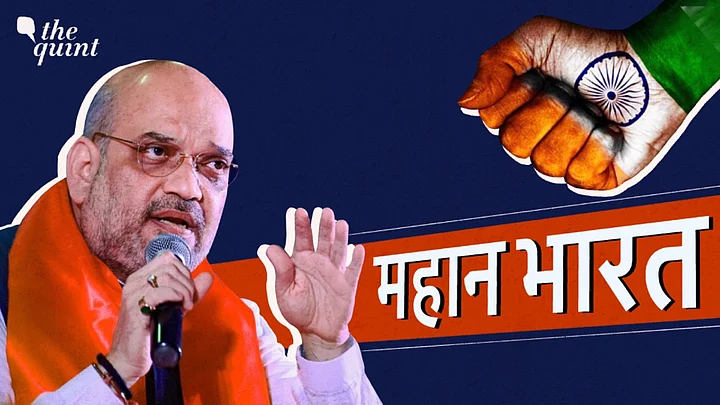It is curious that the BJP has raised a war cry with strong echoes of slogans that proved costly for two of Prime Minister Narendra Modi’s predecessors: Rajiv Gandhi and Atal Bihari Vajpayee.
"We are not seeking a mandate for power or making Modi the PM. We want sampurna bahumat (full mandate) for a Mahaan Bharat,’’ declared Union Home Minister Amit Shah recently at a rally in Maharashtra.
Flip it around and Shah’s exultant call for a "Mahaan Bharat’’ sounds suspiciously like Rajiv Gandhi’s "Mera Bharat Mahaan’’ or Vajpayee’s "India Shining’’. No two situations are the same. And history does not necessarily repeat itself. But surely Shah’s political memory is long enough to recall the electoral disasters associated with those infamous slogans.
Political Catchphrases That Couldn't Capture Nation's Realities
"Mera Bharat Mahaan" was coined on the back of a 400-plus majority for Rajiv Gandhi following Indira Gandhi’s assassination. It was meant to convey the promise of change for the creation of a modern prosperous nation using smart technology through a computer revolution.
Post Bofors, the slogan sank Gandhi by morphing into a parody plastered on the back of auto-rickshaws across the country: Mera Bharat Mahaan, sau mein se ninyaanve pratishad be-imaan (my great country with 99 percent of the population corrupt).
"India Shining" is acknowledged as the biggest PR disaster by any political party. A marketing tagline crafted by an advertising company, it was supposed to tap into an overall feeling of economic optimism.
As it so often happens with advertising slogans, the message was far removed from the reality on the ground where economic and social inequities continued to dog vast sections of the population.
After the BJP lost, Senior Leader LK Advani admitted the inappropriateness of the campaign line which he said gave their opponents an opportunity to question the claim.
Successful slogans encapsulate the realities of their time and tap into the aspirations of their target audience. The country’s political history tells us that people rarely relate to triumphalist motifs, even those that are fuelled by an apparent sense of nationalism by invoking Bharat or India.
India's Sloganeering History: Successes & Failures
Nationalism was a potent sentiment during the freedom struggle when the country was trying to oust British colonial rule. Those years were replete with rallying cries like "Inquilab Zindabad", "Quit India", "Jai Hind", and "Delhi Chalo" which animated the public space.
After Independence, the need to forge a collective identity against a foreign ruler gave way to efforts to tap into unfolding regional, sub-regional, and individual aspirations in response to changing situations.
Indira Gandhi’s "Garibi Hatao" battle cry against the old guard of the Congress, the call for Freedom and Democracy in the post-Emergency election, and her comeback line of "A Government that Works" after the collapse of the Janata Party experiment, all reflect social, political and economic dynamics of the era in which they were minted.
They say that slogans are condensed history. The BJP was quick to latch onto this as its subsequent successes revealed. "Baari Baari Sab ki Baari", "Ab ki Baari Atal Bihari" won Vajpayee the government in 1998. It appealed to the desire to experiment with something new after tiring of the old.
Modi Govt Must Devise Realistic & Relatable Slogans
The "Shining India" disaster prompted Modi’s strategists to play around with the earlier slogan that catapulted Vajpayee to power. The winning lines for 2014 —"Ab ki Baar Modi Sarkar" and "Acche Din" succinctly captured the mood of the day which was overwhelmingly for change after the paralysis in governance in the last two years of the UPA’s tenure.
Interestingly, even in 2019, they stayed the course and eschewed the temptation of triumphalism. The expectations were managed through the promise of a better tomorrow in catchlines like "Modi Hai to Mumkin Hai", "Kaam Ruke Na Desh Jhuke Na." It worked handsomely.
Slogans that touch people usually derive from existing cultural, socio-political, and economic situations. In a country where the gap between the rich and the poor seems to be widening instead of narrowing, there is little room for braggadocio and bluster.
The concept of a "Mahaan Bharat" or "Bharat Mahaan" or "India shining" doesn’t mean much to people who are scrambling for jobs, coping with inflation, or battling social discrimination.
Modi and Shah have shown themselves to be shrewd politicians with their fingers on the pulse of the common man. It boggles the mind then why Shah chose bravado over pragmatism as he raised the "Mahaan Bharat" cry. He must know that triumphalism may cow a weak Opposition. But can it win the battle for the heart and minds of voters?
(Arati R Jerath is a Delhi-based senior journalist. She tweets @AratiJ. This is an opinion piece and the views expressed above are the author’s own. The Quint neither endorses nor is responsible for the same.)
